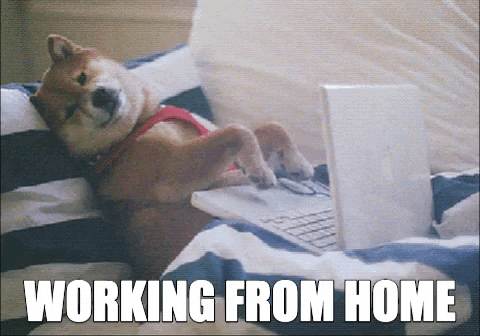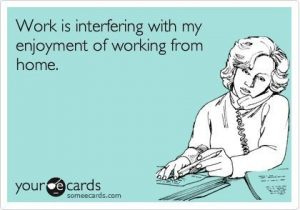Hello Reader
Thank you for coming this way to check out ‘the hawkeye project’. In case you are here looking for Part 3 of ‘The dreaded performance review conversation' (Part 1 & Part 2), then please wait a bit, it is still WIP. Till then, let’s have a conversation about working from home vs office as the pandemic eases off a bit
A few days ago, I posted this on Twitter & LinkedIn and it seems to have resonated well. People pinged back expressing their agreement on this point and some asking for a more in-depth analysis

So here goes
While the COVID-19 pandemic has made us all rethink the way we learn, work and socialise, some of the changes in our thinking and way of doing things have been altered quite substantially. The notion of work and workspace is amongst the most impacted aspects of our lives
Organisations have been split in their views on Working remotely or Working from Home. Going to work meant a certain set of hours in which you gather in common physical space with your colleagues, do your own thing, attend meetings, discuss, engage and in various ways cater to both your work as well as personal/social needs. For many going to work meant the pain of long commute, rush hour traffic and other such inconveniences. For others, it meant the opportunity to chill while working, talking to colleagues and friends, random banter, lunch & tea breaks, office gossip and such
As with so many other things in life, going to the workplace had its shades of positives and not positive features; but it was a given that you had to 'work in the office' and most people did that and did so for some good reasons (as laid out later in this article). Some new age organisations chose to offer the opportunity for people to work from home -- for specific days of the week or under certain conditions
WFH vs WFO
The experience of working from home for the past 18 months, has allowed us to reflect on the pros and cons of both models, helped evaluate what is working best for oneself and various others in the Organisation. To evaluate the suitability of work from home for certain roles, the gating factors would be: level of seniority, desk vs field role, individual contributor vs people manager, structured vs unstructured work and from the individual's perspective the factors would include the availability of a conducive environment at home, self-discipline, communication skills, self-initiative & drive
While there would be exceptions, work from home may be more suited for roles where the employee has structured roles & expectations, gets to work mostly independently, does not have other team members to manage and has enough drive to focus on delivering the outcomes in an unsupervised environment. For many of us, in the middle or senior managerial roles, working with people - either leading, guiding, directing them, collaborating with others across teams and driving definitive outcomes is an essential part of our operating process
and don’t miss part 2
WFH & Deep Work
Now, I am not being dismissive of WFH as not being useful for middle and senior managers. Working from home over the past year and a half has given me meaningful periods to think about problems, plan for the future and reflect on how things are going etc. Under normal circumstances when you work from an office, finding clean periods where you can be with yourself, think and plan were few and far in between. In our open offices, various team members would want just 5 minutes of your time and in a large number of cases, these would be important things where giving 5 minutes (which mostly ends up becoming 15 minutes) is justified. The challenge is that the workday is fractured into a plethora of time blocks where you are unable to concentrate hard and get into what Cal Newport calls a state of 'Deep Work'. Secondly, working from home also meant less socialisation at work. Random conversations over tea and such about work and various other things. While not undermining the value of these 'chai-sutta break' conversations, one should also accept that some of these are time sinks in a busy workday
As a result of fewer number interruptions during the workday and the ability to do a lot more work, I certainly found WFH to have a positive impact on my productivity. The 'To Do' lists that I created at the start of the day could mostly get done, most of the emails and messages could be responded to and in general, a lot more follow up on the things that matter has been possible. The one key positive that I am taking away from 18 months of WFH is that it is more 'Efficient'. All things remaining constant, the quantum of work that can get on a typical day when working from home is higher. But this work is typically less evolved - reviewing approval requests, checking daily reports, follow up on tasks etc.
In contrast to this, working from the office is a lot more about talking to people, problem-solving, having 1x1 conversations, driving consensus, whiteboarding, brainstorming etc. Most of our organisations (certainly my employer Xiaomi India) are designed to be deeply networked where the inter-dependence between teams is high. Most of the work that we do is structured into cross-functional projects and collaboration & coordination to enable such initiatives to succeed is more amenable to work from an office setting. Consider the simple example of resolving a difference in point of view or unclogging a bottleneck, in the traditional work from office context, this could be a simple case of walking over to someone's desk and discussing the problem out, or even snatching a quick one in the corridor and the end of some other meeting. We just figured out ways to reach out to people and get things done
In defence of WFO
Notwithstanding the challenges for WFH in terms of lack of proper infrastructure at homes, the fact that most of our homes are just not designed for this kind of activities (in case you missed the Memes on WFH), the more significant aspect where working from the office differs from working from home is collaboration and managing people. We collaborate within and across teams to strategise and formulate plans, execute and track projects, come together to jointly solve non-trivial problems, motivate and celebrate together. This characteristic of modern organisations in bringing people across functions and levels together, multiple times a day is one of the ingredients that drive their success. This fosters quicker, well-considered and more inclusive decision making, enables differing perspectives to be tabled & heard and as a result, significantly improves the overall sense of ownership and accountability for the decisions and actions taken by the Organisation. While this can be achieved in a work from home setting, the odds are in favour of working from the office being more conducive to driving these outcomes
Essentially, working from the office is just a lot more 'Effective'. While the overall quantum of work might not match working from home given a packed calendar, other distractions that eat away your time, not to forget the largely unproductive time spent in commuting; yet because of the deeply networked and inter-dependent nature of modern organisation design as well as the human tendency to relate to others, being able to influence and read unstated signals, being physically present in offices enables more impactful, higher quality work to be done
There would be valid arguments against this line of thought, especially in the context of global organisations which manage to collaborate across geographies and time zones and still get work done. While not disagreeing, the fact remains that if remote collaboration were such a successful concept, then there would hardly be any need to travel for work, especially to other offices with the same organisation. But if you look back, you can think of so many occasions wherein physical travel to your Branch Office or Head Quarters made things more effective - you developed strong relationships, able to get people to understand your context and collaborate with functional colleagues whose support is essential to get things done
Quo Vadis?
So, given all this, what does the immediate future of work look like?
With the dreaded 2nd wave thankfully behind us and vaccination rates picking up, organisations need to start plotting their back work to work roadmaps, taking careful tentative steps if required, slowly but surely bringing people back to the office. The 18 months & more of the pandemic has seen us shift from a period of confusion, adjustment and eventual joy when things were getting adapted to working from home, to the eventual unhappiness with it due to people juggling childcare, household chores, long work hours, blurring of the lines between work and personal lives and in many cases also just getting tired of others in the same house
The impact on mental health & wellbeing of such sustained working from home will be ascertained in the future, for now, we need to start thinking of getting people back to the workplace, start with the ones who have been double vaccinated and have had 15 days or more since their second shot, keep the attendance percentage to a low 20-25% and rigorously drive COVID appropriate behaviour in the workplace. There will be resistance from certain sections who seem to have grown very comfortable with working from home and also from those who have chosen to move to other smaller towns or home towns for a support system or better quality of living. But if working from the office is what is deemed to benefit the organisation, then such back to work hesitancy should be dealt with through outreach, education and confidence building
Now is perhaps the time for us to overweight effective work from the office vs efficient work from home and set the stage to get back to the ‘old’ normal
Did this post ring a bell? If so, please do share this and get the conversation going
You can find me on Twitter, LinkedIn & Instagram








effeciency vs effectiveness ,
zoom vs vroom
thumbs up sign vs a pat on the back
screen time vs a friendly lunch time
The way the world works has changed a lot but there are some things like a friendly hug which will never change . But yes to be successful one has to be effective and efficient both .
Thank you Murali for this wonderful and thought provoking write up . very well articulated .
Look forward to more or as we say Yeh Dil Maange more